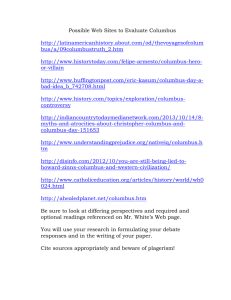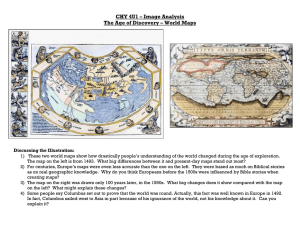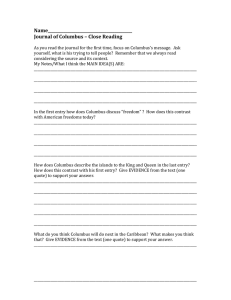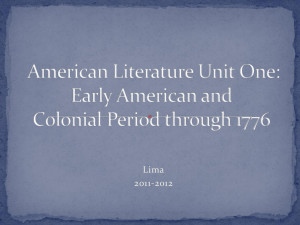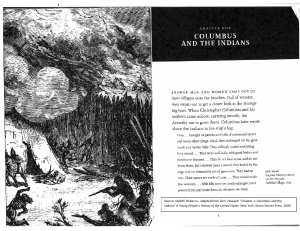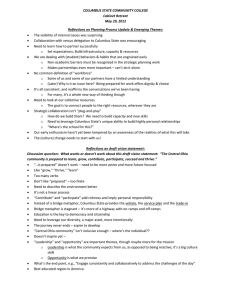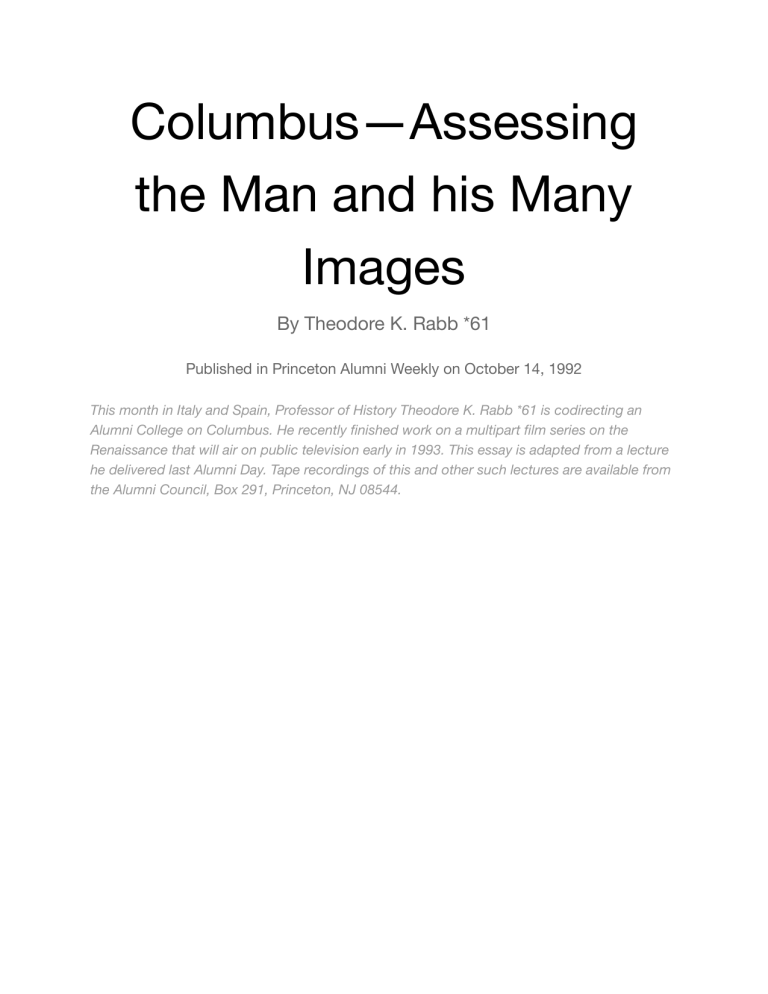
Columbus—Assessing the Man and his Many Images By Theodore K. Rabb *61 Published in Princeton Alumni Weekly on October 14, 1992 This month in Italy and Spain, Professor of History Theodore K. Rabb *61 is codirecting an Alumni College on Columbus. He recently finished work on a multipart film series on the Renaissance that will air on public television early in 1993. This essay is adapted from a lecture he delivered last Alumni Day. Tape recordings of this and other such lectures are available from the Alumni Council, Box 291, Princeton, NJ 08544. Columbus the hero? The masterful mariner navigated into the unknown and fathered the Christian civilization of two continents. Historians believe that this portrait, a 1575 woodcut after an anonymous painting, is most likely to be a faithful image of the great explorer. Columbus the villain? The vainglorious fanatic didn’t “discover” anything, didn’t even know what he had found, and began Europe’s ghastly exploitation of the rest of the world. The portrait is a sixteenth-century painting by Lorenzo Lotto. Martin Behaim, a German Geographer, constructed in 1498 a terrestrial globe that shows the European continent of the world just before Columbus sailed. Recognizable at right in this engraving are Iceland, Ireland, Spain, and West Africa, as well as the Azores and Canary Islands. “Cipangu” is Japan. Ralph Waldo Emerson once said that every hero becomes a bore at last. And in some respects that is precisely the fate that Christopher Columbus has suffered. For hundreds of years, he stood as the symbol of the intrepid explorer. He was regarded as one of those rare figures who had done what seemed, in his time, completely unimaginable. Quite alone, and with just his own burning vision to propel him forward (unlike today’s astronauts, who are backed by huge teams), he drove his very reluctant crew westward until they sighted land—a land that some had speculated might be there, but no one was sure could be found. And he persisted in pursuing his dream despite endless troubles. We don’t know a great deal about the early life of Columbus, but it seems to have been filled with disappointment after disappointment. Time and again, he was rejected by potential sponsors, by people who he thought might share his vision, and he went through a period of terrible poverty in Seville, when he had to earn his living as a jack-of-all-trades. He lived most of his life in foreign lands, suffering all the disabilities that any foreigner suffers—he never spoke new languages very well—and he was therefore always an outsider, indeed somewhat of a pariah. Yet he persisted, It is an extraordinary story of courage, determination, and endurance. Once his trans-Atlantic voyage of 1492 began, other problems arose. He lost the Santa Maria, and everyone had to crowd aboard the two small ships, the Pinta and the Nina, that remained. They experienced dreadful storms. Columbus himself felt at times that they might never make it back home. And then, when they did, he had the misfortune to make landfall in Portuguese territory—not exactly the most welcoming spot. The Portuguese had rejected his proposed voyage, and they were deeply suspicious of what he was doing. But with great determination and skill, he talked his way out of a very sticky situation, including proposals to clap him in irons and execute him, and arrived back in Spain. Columbus is, in short, one of the few visionaries who turned a vision into a reality. That’s very rare in history, and therefore it’s not surprising that he became a symbol of extraordinary achievement—the father of an entire continent. It was conceded that he had failings: for example, his poor record as governor of the Caribbean islands he had discovered. But on the whole, such failures were dismissed as the foibles of a great man; nobody, after all, is perfect. And so the image was created. For decades after it was published, in 1942, the standard biography of Columbus was Admiral of the Ocean Sea, by the Harvard historian Samuel Eliot Morison, himself a distinguished sailor. The ending of that book gives a sense of the feeling that could be aroused by Columbus just fifty years ago: One only wishes that the Admiral [Columbus] might have been afforded the sense of fulfillment that would have come from foreseeing all that flowed from bis discoveries; that would have turned all the sorrows of his last years to joy. The whole history of the Americas stems from the Four Voyages of Columbus; and as the Greek city-states looked back to the deathless gods as their founders, So today a score of independent nations and dominions unite in homage to Christopher the stout-hearted son of Genoa, who carried Christian civilization across the Ocean Sea. Well, you can imagine that after four hundred years of praise like this, the subject did begin to get rather boring. But how else could one write about a man who, even in Morison’s book, was portrayed hardly differently than he had been four hundred years earlier? One possibility, as the reverence became boring, as it became too much to bear, was for everyone to switch tack. Now different things are emphasized about Columbus. He made slaves of the Indians. He killed other Indians. He was an appallingly cruel and ineffective governor of Spain's small Caribbean colony. Moreover, he by no means discovered the continent: others had been there before, even Eutopeans. And not only did he not discover it; he misunderstood what it was he had found. He was, to be charitable about it, a fool who was taken advantage of by others, because he often didn’t seem to understand what was going on around him. In his personal life, he abandoned the mother of his illegitimate son—the son who later trumpeted Columbus’s fame in the first “authorized” biography. He was vainglorious. He loved all the trappings of the great titles he had won. He was an opportunistic adventurer and the founder of the ghastly exploitation by Europe of the world outside Europe. And, in a recently conjured-up phrase, he was the destroyer of the paradise that had been the New World. In other words, he is now one of the great villains of history. Russell Means, an American Indian historian of the conquest of America, has taken the current revisionism about as far as it can go, writing that Columbus “makes Hitler look like a juvenile delinquent.” So it’s no wonder that, in The Mysterious History of Columbus (1991)—probably the best of the books on Columbus of the last few years—John Noble Wilford struggles to balance these different views even as he struggles with our dearth of knowledge about the man. We don't know exactly where he landed on October 12, 1492, for example, and we don’t even know where his bones are. Some people get terribly angry when others suggest that their island is the wrong one, or that their tomb is the wrong one (there are three possibilities). Faced with all these disputes, Wilford finally feels driven to quote none other than F. Scott Fitzgerald ‘17: “Show me a hero and I will write you a tragedy.” What should we make of this? Is there something perverse in this age of ours that encourages moral hindsight and enjoys exposing former dreams as little more than nightmares? Is this assault on Columbus in fact ahistorical (the harshest word a historian can utter)? Are both the accusations and the praise unfair? Returning to the question of how boring Columbus became, is it possible that after a while we have to think things through from a completely different point of view? We historians rarely leave well enough alone. If everyone says that Lincoln saved the nation and was one of the most humane figures who ever lived, the only way to make a splash is to deny it. And by the same token, it’s not hard to suggest that we have been unfair even to Attila the Hun. In some instances, this balancing—this moving back and forth by historians—makes the picture more rounded. Rather than merely creating incompatible and unresolvable antitheses, the revisions often produce a more nuanced view. A case in point is a contemporary of Columbus, Machiavelli, who still suggests a figure of evil. He is, in our imagination, the cackling, amoral cynic who saw only the worst in human beings and told everyone to act on that basis. And yet it has become clear that Machiavelli was a burning idealist. He was a great patriot of Italy and of Florence, and his ideas inspired a whole series of political reformers, not tyrants. If you want to trace his legacy, you’re more likely to find it among the English revolutionaries of the mid-seventeenth century than among their contemporaries at the court of Versailles. This different view—this revision—is much fairer to Machiavelli himself. It reflects what he was trying to accomplish, and what those who knew him at the time thought of him. It’s an appropriate way to redress a balance. Can we do the same with Columbus? At the outset, I must say that it’s much harder to arrive at Truth—historians tend to shudder at the word—when the symbol overtakes the reality. The trouble with Columbus is that, in many ways, he is just a cipher. There are very few major public figures since the end of antiquity about whom we possess so little hard information. There is so much we don’t know—about what he was trying to do, about why he tried to do it. We still don’t know for sure that he failed to realize there was a huge continent between Europe and Japan. And yet, despite our ignorance (perhaps because of it), he has taken on gigantic symbolic meaning. We are equally ignorant about other people who loom large in our history. Shakespeare, who lived a hundred years after Columbus, is an obvious analogy. We know very little about him, and this deficiency has spawned an entire industry that makes up what can't be found in historical records, But Shakespeare was never a public figure; there is no reason for us to have a great deal of information about him. Indeed, the data we do have are about what we should possess for an ordinary individual of his time. Columbus, by contrast, was a public figure. He was already famous in his own lifetime, and it is unusual that we know so little about him. As a result, we can hardly think of him anymore as a living, breathing human being. For Samuel Eliot Morison, Columbus is the archetypal gallant sailor. For Russell Means, he encapsulates all that is evil in Western civilization of the last five hundred years. But neither of these views is more appropriate than the other. Both are highly personal impositions on a vague, floating, unapproachable symbol. What makes our task even more difficult is that these different views have now become entangled in politics, and when politics enters the picture, the result is almost always a distortion. Opposing politicians typically caricature each other; when we bring political notions to bear on someone who has been dead five hundred years, therefore, the results are predictable. In general, the Renaissance—the period that I have spent my life studying—tends to get the short end of the stick from those who really want to assail the modern world; and it gets oversold by those who love the modern world. Neither group, however, has a real interest in the Renaissance. It was during the Renaissance, for example, that modern science was invented, and of course that led either to nuclear bombs or to antibiotics—take your pick. The Renaissance created capitalism, and of course that led either to exploitation and pollution or to wealth and opportunity—again, take your pick. In all this, the Renaissance and its people tend to vanish from sight, becoming surrogates for modern issues and causes. If an entire era can be tossed around like that, what chance does a not very thoroughly documented individual have? We didn’t invent the rewriting of history for political ends—the ancient Greeks were doing it—but we've made it so sophisticated that it often buries everything else. For centuries, Columbus seemed a fairly harmless hero—the sort of person you could say was a hero without worrying too much about it. He was clearly an example of extraordinary human achievement. If he was controversial, it was only because he provoked a rivalry between Hispanics and Italians, who both claimed him as their own. Now, however, he gets everyone upset. The United Nations, for example, had to cancel plans for a worldwide celebration this year. Every mention of his name seems to carry political implications. Of course, all historians exercise moral hindsight. We do judge. There's no point in looking at history unless you're going to derive a story out of the great jumble of documents, relics, and so forth. We do have values, and these values are the basis of our judgment. But how far should we let them inform what we say, and where must we stop and suggest that this is no longer a value but an ideology? In my view, when we assess the reputation of an age and, in particular, the reputation of an individual, we should seek to remain faithful to what Leopold von Ranke, the founder of modern historiography, called history “as it really was” — essentially the motto of my profession. Unless we try to get inside the heads of people who died a long time ago, and unless we try to show what they did in their terms, then the historical enterprise fails. And that is what we must try to do with Columbus. We must start by stripping away the symbols, and then attempt to bring back the world in which he lived. It’s all very well to berate him or praise him for all the unintended consequences of his life. But that’s not a philosophy for historical analysis, and no way to deter- mine heroism or villainy. What were the consequences Columbus intended? What was he trying to do, and why was he doing it? First of all, Columbus is incomprehensible if we don't understand that he was a profoundly religious man. He couldn’t have been anything else, given the world in which he grew up and the fact that he spent much of his adult life in Spain. Indeed, Spain must have been appealing to him precisely because he had in him a streak of mysticism that, while uncommon in Genoa, was widespread in Spain. Just a few years after Columbus's death, that mystical streak in Spanish Catholicism—a sense of religion as an internal fanning of the divine flame, as a union with the godhead—became even more pronounced thanks to St. Teresa of Avila. Columbus lived through, and participated in, possibly the greatest single religious enterprise of the fifteenth century: the reconquest of Granada, the last Muslim stronghold in Spain. He also lived through, and as far as we know approved of, the expulsion of the Jews from Spain. There is no question that Columbus fully shared the fervor that accompanied these events. In his writings, he speaks of their participants as having a sacred, crusaderlike mission. Moreover, from the time of Columbus all the way down to Samuel Eliot Morison, the leaders of the West strongly believed in the importance of bringing Christianity to places where it had never been before. Just because nowadays people generally find it harder to believe in such a mission is no reason to discount it as a motive for Columbus. To denigrate this motivation is also to denigrate the Christianity that animated Thomas More, Martin Luther, and El Greco. Second, Columbus was an immensely serious and even learned explorer. He didn't just “head out” to sea, happen to catch the right wind, and—lo and behold—discover America. Determined to get the best information he could, he spent years consulting the finest navigators, mapmakers, mathematicians, and geographers. If he got things wrong, then most of them did, too. And like all the intellectuals of his time, he gave credence to many authorities—particularly from antiquity—who didn’t deserve it. In that humanistic age, the ancient world was assumed to be superior, so whatever the ancient Romans and Greeks had said was considered likely to be true. Late in life, Columbus compiled a notebook of writings that he had found particularly meaningful and influential, the so-called Book of Prophesies, He didn’t think of these texts as fairy stories (which they were) but as truth. It was absolutely typical of his age that he took seriously passages like the following one, from the Roman writer Seneca. No one could explain why Seneca would have known anything about overseas exploration, but the point was, It was Seneca! He was a great and famous philosopher of ancient Rome, and therefore he must have known. Here is what Columbus copied down: “There will come a time when the Ocean will loose the chains that fetter things, and a great land will lie revealed, and a new mariner, like unto him who was Jason’s pilot, . . . will reveal a new world.” You can almost hear Columbus exclaim, “Wow! Fifteen hundred years ago, the man already knew that I was going to come along and do just that.” It’s exactly like the admiration for Nostradamus that survives inexplicably to our own time, and it’s closely related to the belief in horoscopes in the daily newspapers. The text echoes what you want to hear, and can be used to justify whatever it is you were going to do in the first place. But Columbus’s interest in that ancient passage merely reflected what his contemporaries were doing: he was researching in accordance with the best current scholarship and taking all the lessons from the past that anyone else of his time would have taken. His approach makes sense if we consider him in the terms of his own day. Third, Columbus was a pretty savvy operator in the political world of the 1490s. It was no smal! feat for the son of a weaver from Genoa to work his way to the very top levels of the Spanish court. At the time, Spain, and especially its government and nobility, was hierarchical, protocol-conscious, and full of faction. It was a very dangerous place in which to try to get ahead. Yet Columbus managed it, and that in itself was one of his most remarkable achievements. And once he'd made extravagant titles that his exploits had earned him: Admiral of the Ocean Sea, Viceroy of the Indies, etc. He never signed his name without them. But this practice identifies him only more directly as a creature of his times: it was terribly important to have grandiose titles. Columbus understood almost instinctively what their resonance was, and could thus manipulate his own image, in an age when that skill was already beginning to be appreciated. Finally, the characteristic that perhaps most clearly distinguishes him: Columbus was one of the smartest, most skillful, and most daring sailors of the age. There are other stories of incredible determination and bravery from the age of exploration: Magellan’s crossing of the Pacific is in many ways a more remarkable feat than Columbus’s crossing of the Atlantic. Another such story concerns an English sailor named David Ingram who escaped from some Spaniards who had captured him on the coast of Mexico in 1568. Eleven months later, he showed up on the coast of Nova Scotia, where he was rescued by a French ship. No one ever found out how he had traversed a continent almost completely unexplored by Europeans, but there is no question that he did it. In other words, the age was full of people doing extraordinary things. But no exploit was more remarkable than Columbus’s first voyage into the unknown: sailing out into uncharted waters and setting an example for all who followed. If he has to be a symbol of anything, then it should be of the vocation of the explorer. He was not particularly exceptional as a joiner of separate worlds, as a charismatic, self-made man, as a mad colonial governor, as an enslaver of Indians, or as an exemplar of any of the other roles in which he is being cast. But he was exceptional as a seaman and as an explorer in an age that was rich in both. What I suggest, then, is that the most appropriate assessment of Columbus is to see him as a Renaissance man: a typical representative of those curious and restless folk who opened up so many new worlds—geographic, intellectual, artistic, and political. Like all his contemporaries, Columbus had both virtues and flaws (and great ones, too). But to summarize his complex achievements and failures as either heroic or villainous is to give him either too much or too little credit. He was inescapably a man of his times, and because it was his age that did so much to create our own, an effort to understand him fairly, in terms that he himself might have recognized, is no more or less than an attempt to understand ourselves.

